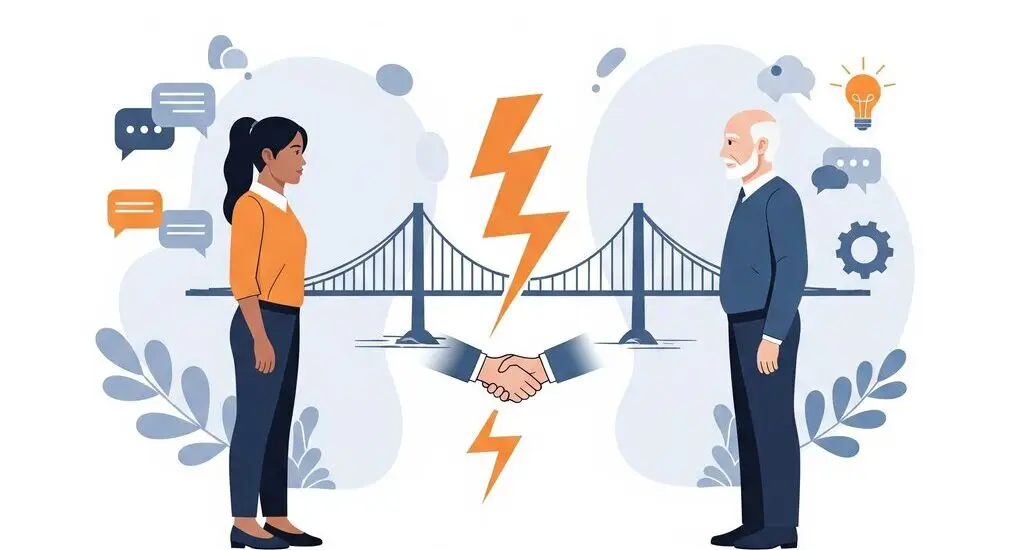Turn those Conflicts into Opportunities
- June 26, 2025
- Posted by: Rhizome Desk
- Categories: Leadership, Work

Conflict is like a necessary evil that needs to happen for a team to continue to learn about their diversity, commonalities, and uniqueness, in order to be more collaborative and productive.
While it is profound to take a proactive step to combating conflict, that is, preventing it from happening or creating mechanisms to avoid conflict, it is more realistic and resilient to master the act of turning conflicts into opportunities.
Case Study: Nnenna’s Crossfire—Turning Conflict into Opportunity
Nnenna had just secured a graduate trainee role with a fast-paced organisation specialising in facilitating private-public partnerships. With her fresh energy, curiosity, and knack for delivering results, she quickly gained the attention of her programme lead, Mr. Afolabi. Impressed by her diligence and forward-thinking approach, Afolabi began assigning Nnenna more complex tasks and infusing her to work under the guidance of more senior colleagues on high-stakes projects. He praised her work in team meetings and entrusted her with opportunities usually reserved for more senior staff. Nnenna, eager to prove herself, embraced the additional responsibilities.
However, not everyone in the team shared Afolabi’s enthusiasm for Nnenna’s rapid rise. Senior team members, who had years of experience and had worked through the ranks, started to view her as overstepping her boundaries. In their view, Nnenna was a trainee, and the tasks she was now handling fell well outside her scope, even thou she was delivering. The whispers started, with comments suggesting that she was trying too hard to impress or even threaten their positions. Nnenna began to notice a growing tension in the office—cold stares, side comments, and fewer invitations to collaborate.
It didn’t take long for the crossfire to reach her. One afternoon, during a team meeting, one of the senior staff members, Mr. Adeoye, openly challenged Nnenna’s involvement in a project that was clearly outside her remit as a trainee. His tone was sharp, and the air in the room thickened with unspoken tensions.
The Turning Point
Nnenna, taken aback by the direct confrontation, felt a rush of emotions—confusion, fear, and frustration. However, rather than reacting defensively, she saw this as an opportunity to address the underlying tension head-on. After the meeting, Nnenna requested a private conversation with Adeoye, explaining that her goal was not to overshadow anyone but to learn from everyone around her.
In their conversation, Nnenna expressed genuine respect for the senior team members, acknowledging that she was new and still had a lot to learn. She also recognised that the additional tasks she had been given might have come across as overreaching. However, Nnenna asked Adeoye for his continued guidance in navigating her responsibilities better, seeking his advice on how to balance learning opportunities with respect for team dynamics.
To her surprise, Adeoye softened. He admitted that her enthusiasm was impressive but that he and other team members had felt sidelined by how much Afolabi had come to rely on her. Nnenna, seeing the root of the problem, assured Adeoye that she wanted to collaborate, not compete. She asked if he could help mentor her on projects where his expertise could truly shine, emphasising that she valued his experience.
Building Bridges
Word spread quickly about Nnenna’s conversation with Adeoye. Soon after, she began reaching out to other senior team members, requesting their input on different projects and seeking their mentorship in areas she hadn’t yet explored. Instead of trying to handle tasks on her own, Nnenna used each project as an opportunity to involve those around her, making it clear that she saw herself as part of the team, not above it.
Gradually, the once-cool relationships with her colleagues began to thaw. They started sharing insights, offering her advice, and even praising her in meetings for her willingness to learn. Afolabi noticed the shift as well and commended Nnenna for turning a potentially damaging conflict into a collaborative effort. What had initially been a rift in the team evolved into a culture of shared responsibility and mutual growth.
Outcome
Nnenna’s ability to turn the tension with her senior colleagues into an opportunity for collaboration transformed not only her relationships but also the team’s dynamic. By addressing the conflict head-on and acknowledging the expertise of her senior colleagues, she was able to earn their support and learn invaluable lessons early in her career. In the end, Nnenna emerged as a bridge-builder—someone who understood that conflict, when handled correctly, could create new avenues for growth and understanding.
This experience taught Nnenna that conflict in the workplace is not inherently negative. It’s a necessary part of learning about the different perspectives and strengths of a team. By shifting the focus from competition to collaboration, Nnenna turned a crossfire into an opportunity to grow, solidify her position, and contribute meaningfully to the team’s success.
Conflicts are in different forms. Yours might not be as shaped as Nnenna’s, but within every conflict is the opportunity to become better as a team and to improve overall organisational resilience.
Those conflicts will come. As they do, remember to turn them into opportunities.
